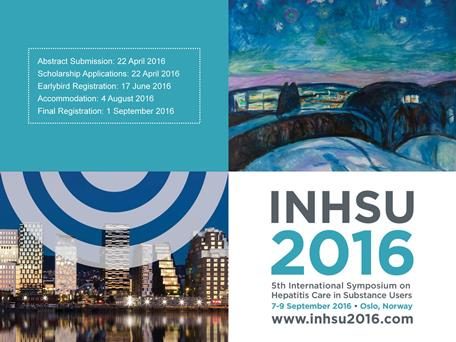
People who use drugs – an important, but sometimes forgotten piece of the hepatitis C elimination puzzle
People who use drugs are disproportionately affected by hepatitis C. However, the majority of those affected are currently not adequately reached. With the World Health Organization’s new elimination targets for hepatitis C, enhancing hepatitis prevention and care for people who use drugs is of paramount importance in our efforts to strive towards global hepatitis C elimination.
Almost a decade ago, I remember standing in front of my poster at a large international liver conference. It was the same old story year after year: research on hepatitis C among people who use drugs was simply not considered a priority and was often relegated to the poster sessions.
In 2009, Dr. Philip Bruggmann, decided to change this by organizing the 1st International Symposium on Hepatitis in Substance Users held in Zurich, Switzerland. The conference provided a forum for supporting and facilitating scientific exchange and dissemination of knowledge focused specifically on hepatitis C infection among people who use drugs.
After this symposium, in 2010, Philip pioneered the International Network on Hepatitis in Substance Users (INHSU) together with Dr. Markus Backmund and Professor Geert Robaeys. After six years of dedication moving INHSU forward, Philip stepped down as President and asked me to step in and continue his important work in this area.
Supporting and facilitating scientific exchange and dissemination of knowledge
After the first International Symposium on Hepatitis Care in Substance Users was held in 2009 in Zurich, Switzerland, meetings occurred in Brussels, Belgium (2011), Munich, Germany (2013) and Sydney, Australia (2015). In 2015, INHSU moved to an annual symposium to keep pace with the rapid development of new therapies and exciting new research on HCV care among people who use drugs. This year’s INHSU 2016 symposium will be held in Oslo, Norway from September 7-9, 2016. The conference is organized in collaboration with the Australasian Society for HIV, Viral Hepatitis and Sexual Health Medicine.
The meeting covers three specific areas:
- Epidemiology and public health;
- Treatment and care; and
- Treatment access and implementation.
INHSU prioritizes partnerships with a number of community organizations in order to enhance the involvement of the affected community. This year INHSU 2016 includes a pre-meeting workshop led by and for community members and advocates. By bringing together health professionals, researchers, community organizations, people who use drugs and policy makers, this forum facilitates dialogue and fosters effective partnerships focused on developing novel strategies to enhance hepatitis C care among people who use drugs.
Our organization regularly works together with other international organizations, such as the European Association for the Study of the Liver (EASL), to hold combined symposia to enhance scientific dissemination.
In 2015, INHSU also successfully launched two special issues published in the International Journal of Drug Policy focused on the management of HCV among people who use drugs.
Enhancing education and training
Over the next year, INHSU will continue collaborating with the Australasian Society for HIV, Viral Hepatitis and Sexual Health Medicine (ASHM) and The Kirby Institute of UNSW Australia to develop an education and training program for health practitioners which will be available for members. INHSU is also collaborating with these two institutes, as well as the Australian Injecting & Illicit Drug Users League, to develop health promotion materials for people who use drugs that will also be available for members. Stay tuned for further information.
Advocacy for HCV prevention and care among people who use drugs
As part of one of the special issues in the International Journal of Drug Policy, INHSU compiled an update of the “International recommendations for the management of HCV among people who use drugs”. We also contributed to an editorial in the EASL Journal of Hepatology advocating for the removal of reimbursement restrictions based on drug and alcohol use criteria which are present in some jurisdictions.
Most recently, INHSU has been working with the Digital Clinic to develop the Change Project, a series of videos focused on experiences with interferon-free therapy among people who use drugs and barriers/challenges to HCV care in low and middle-income settings:
It has been an incredibly busy and productive year for INHSU with great progress being made in a number of areas. If you would like to participate in this community of like-minded people working to improve the lives of people who use drugs living with hepatitis C, I would urge you to consider becoming a member here.
Also, if you are interested in partnering with INHSU, please don’t hesitate to contact me (jgrebely@kirby.unsw.edu.au). I look forward to working with the wider liver community in the continued development of INHSU in the coming years. See you in Oslo!
Hepatology, Medicine and Policy has launched with BioMed Central. For more information, visit: www.hmap.biomedcentral.com.
Comments